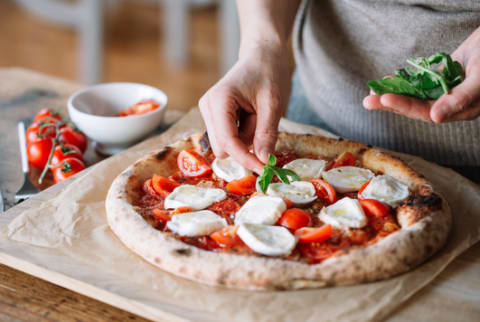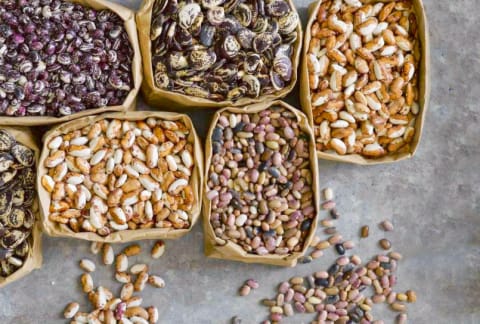Advertisement


Salt, Fat, Acid, Heat is one of the most unique cookbooks I’ve ever read—so much so that I’m actually hesitant to label it as such. Instead of just sharing recipes (although she does that too!), former Chez Panisse chef Samin Nosrat breaks down the elements of cooking so readers can truly understand what makes food taste the way it does. When you’ve finished it (I read it cover to cover in a few nights), you’ll feel like you attended culinary school from the comfort of your living room. Here, she shares a few genius tips to make everything you cook a little bit healthier.
1. Garnish dishes with herb salsa.
Herbs are some of the most nutrient-dense ingredients in the kitchen, but most folks don't consume enough of them to feel their positive effects. Chopped herbs, good olive oil, a pinch of salt, and some shallots soaked (or macerated) in vinegar will elevate grilled fish, meats, vegetables, and soups alike.
2. Parmesan cheese is a secret weapon.
Full of flavor and umami, real Parmigiano Reggiano will make practically anything and everything taste better. Just grate a little into or over soups, pastas, egg dishes, rice, and roasted vegetables. And save the rinds to add into pasta sauces, stews, and soups—they'll add remarkable flavor!
3. Use more acid.
Learn to use acid to balance flavors on a dish or in a meal. Whether in the form of vinegar, a squeeze of lime or lemon, or a little mustard, hot sauce, or yogurt, a little acid can do a lot to heighten flavors.
4. Cook a pot of beans each week.

Beans are inexpensive, filling, and full of protein and fiber. Soak them overnight in plenty of water with a palmful of salt and a pinch of baking soda, then simmer the next day until tender. Use them in salads, side dishes, soups, and pastas.
5. Make your own stock.
Besides tasting indescribably better than its store-bought equivalent, homemade stock is also higher in gelatin (good for your stomach lining) and lower in sodium and other unwanted ingredients such as turmeric (I love turmeric, but it has no place in chicken stock) and yeast extracts.
6. Add salt to food earlier.
By adding salt early—even the day before to meats intended for roasting and braising—and tasting and adjusting seasoning as you cook, you'll often end up using LESS total salt. When food is properly seasoned from within, you'll be less likely to reach for the salt shaker at the table in hopes of remedying blandness at the last second.
7. Learn classic spice combos.
Memorize a few classic flavor combinations from around the world. Suddenly, with just a handful of basic techniques under your belt—roasting, simmering, braising, grilling—you'll have access to all sorts of variations. Spices are a gateway to the world. Lamb braise can be Moroccan one night, Provençal the next, and Greek on the third. A pot of chickpeas can be Indian at one meal and Mexican at the next.
8. Properly season water for boiling vegetables.
Add enough salt to make your blanching water taste like the summer sea. When cooking water is more highly seasoned—and more mineral-rich—than the green vegetables you plan to cook, the veggies will absorb salt from the water as they cook, seasoning themselves from the inside out. They'll remain more vibrantly colored, cook more quickly, and lose fewer nutrients.
9. Preheat your pan, and your fat.
When sautéing, heat your pan to reduce the amount of time fat spends in direct contact with the hot metal, minimizing opportunity for it to deteriorate. As oil is heated, it breaks down, leading to flavor degradation and the release of toxic chemicals. Food is also more likely to stick to a cold pan—another reason to preheat. You'll know it's time to add food to the hot fat when it shimmers in the pan.
10. Take good care of your oils.
Constant temperature fluctuations from a nearby stove or daily brushes with the sun’s rays will encourage cooking oils—and particularly olive oil—to go rancid, so store it somewhere reliably cool and dark. If you can’t keep it in a dark place, store olive oil in a dark glass bottle or metal can to keep light out.
Now, it's time to get cooking! Toss some of this age-reversing ingredient in the mix, or hit up these delicious turmeric-packed recipes.